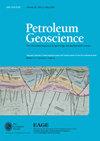评价四维地震数据伪影对数据同化的影响
IF 2.1
4区 地球科学
Q3 GEOSCIENCES, MULTIDISCIPLINARY
引用次数: 1
摘要
时间推移或4D地震数据(4DS)是储层研究中的重要制约因素,因为它们能够监测碳氢化合物生产引起的饱和度和压力变化。在历史匹配或数据同化(DA)程序中,4DS与生产数据一起被定量添加,以减少不确定性并改进生产预测。在进行定量研究之前,重要的是确保4DS是可靠的,具有最小的伪影,如旁瓣效应,这可能会干扰异常的识别。在这项工作中,我们针对实际油藏提出了不同的DA中4DS的处理方法。明确地说,当考虑不同数量的4D信息和对已识别伪影的三种处理时,我们评估了对DA结果的影响。处理方法是:忽略它们,将它们排除在DA之外,或者定义它们所在的位置没有地震变化。结果表明,当4DS被同化时,井和地震匹配得到了改善,也提高了产量预测。尽管是一个薄储层,但同化两个单层图使我们能够预测相关的观测动态行为,例如较低层段中的演化气体。此外,当对伪影进行处理时,它们产生了比使用单个双层映射更好的模型(具有更低的产生误差和视觉上更接近观测数据的阻抗)。我们的建议是同化油井和4DS数据,排除不可靠的信息,以便做出更好的生命周期决策。本文章由计算机程序翻译,如有差异,请以英文原文为准。
Evaluating the impact of 4D seismic data artifacts in data assimilation
Time-lapse or 4D Seismic data (4DS) are important constraints in reservoir studies because they enable monitoring of saturation and pressure changes that result from hydrocarbon production. 4DS have been quantitatively added, along with production data, in history matching or data assimilation (DA) procedures to reduce uncertainty and improve production forecasts. Before performing quantitative studies, it is important to ensure that the 4DS are reliable, with minimal artifacts such as side-lobe effects, that can disturb the identification of anomalies. In this work, we propose different ways of treating 4DS in DA for a real reservoir. Explicitly, we evaluated the impact on DA results when considering different amounts of 4D information and three treatments to the identified artifacts. The treatments were: ignoring them, excluding them from DA, or defining no seismic changes at their locations. The results show that well and seismic matches are improved when 4DS are assimilated, also improving the production predictions. Despite being a thin reservoir, assimilating two single-layer maps allowed us to predict relevant observed dynamic behaviour, such as the evolved gas trapped in the lower interval. Furthermore, when a treatment was applied to the artifacts, they produced better models than using a single two-layer map (with lower production errors and visually closer impedances to the observed data). Our recommendation is the assimilation of well and 4DS data, with the exclusion of unreliable information, for better life-cycle decisions.
求助全文
通过发布文献求助,成功后即可免费获取论文全文。
去求助
来源期刊

Petroleum Geoscience
地学-地球科学综合
CiteScore
4.80
自引率
11.80%
发文量
28
审稿时长
>12 weeks
期刊介绍:
Petroleum Geoscience is the international journal of geoenergy and applied earth science, and is co-owned by the Geological Society of London and the European Association of Geoscientists and Engineers (EAGE).
Petroleum Geoscience transcends disciplinary boundaries and publishes a balanced mix of articles covering exploration, exploitation, appraisal, development and enhancement of sub-surface hydrocarbon resources and carbon repositories. The integration of disciplines in an applied context, whether for fluid production, carbon storage or related geoenergy applications, is a particular strength of the journal. Articles on enhancing exploration efficiency, lowering technological and environmental risk, and improving hydrocarbon recovery communicate the latest developments in sub-surface geoscience to a wide readership.
Petroleum Geoscience provides a multidisciplinary forum for those engaged in the science and technology of the rock-related sub-surface disciplines. The journal reaches some 8000 individual subscribers, and a further 1100 institutional subscriptions provide global access to readers including geologists, geophysicists, petroleum and reservoir engineers, petrophysicists and geochemists in both academia and industry. The journal aims to share knowledge of reservoir geoscience and to reflect the international nature of its development.
 求助内容:
求助内容: 应助结果提醒方式:
应助结果提醒方式:


